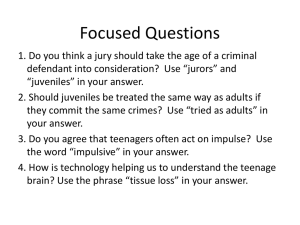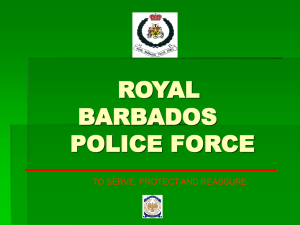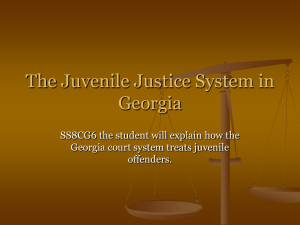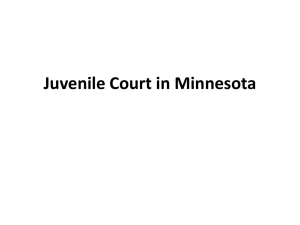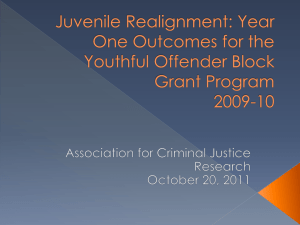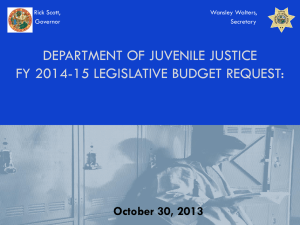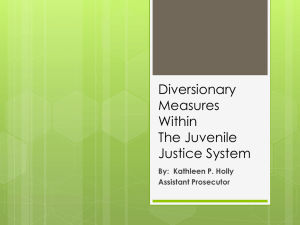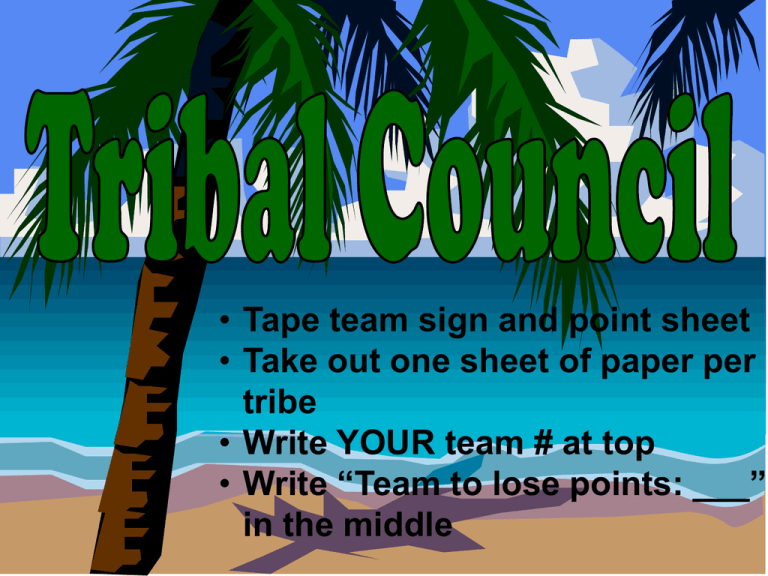
• Tape team sign and point sheet
• Take out one sheet of paper per
tribe
• Write YOUR team # at top
• Write “Team to lose points: ___”
in the middle
Supreme Court
Higher-ranking
courts
__7_ Judges
Elected by __popular__ vote
Chief Justice is chosen by _the other judges__
___12___ Judges
Elected by popular vote
_4__ divisions in Georgia
State
Court
_70_
Courts
__105_
Judges
(circle one)
Superior __Court___
__188___ Judges
Elected by popular vote
___49____ Circuits in Georgia
Probate
Court
_159__
Courts
_159__
Judges
Juvenile
Court
__159__
Courts
_159__ Judges
and Associate
Judges h
(circle one)
Trial Court
or
Appellate
Court
Court of _Appeals__
Lower-ranking
courts
Trial Court
or
Appellate
Court
Magistrate
Court
_159___
Courts
_159 Chief
magistrates
346_magistrates
Trial Courts
or
Appellate
Courts
(circle one)
Municipal
Court
• 370 courts
• 350 judges
DAY 10: The Juvenile
Justice System of GA
SS8CG4.c - Describe the history of the
juvenile court.
SS8CG4.d - Compare the juvenile justice
system to the adult justice system,
emphasizing the different jurisdictions,
terminology, and steps in the criminal
justice process.
SS8CG4.e - Describe the rights of juveniles
when taken into custody.
Immunity Challenge: There’s
Nothing Comical About It!
GA GOVERNMENT
EDITION
A Little Background
on Juvenile Court
• In 1906, the GA General
Assembly passed a law
creating a special court for
those under 17 (called
juveniles).
– Once you are 17, you are
charged / tried in court as an
adult
• 1st juvenile court in GA was
in Fulton County in 1911;
Today, ALL 159 counties
have a one.
• Juvenile court judges are
appointed to their positions
by superior court judges.
Why have juvenile courts?
Three main purposes:
1. To help protect the wellbeing of children.
2. To make sure that any child
coming under the
jurisdiction of the court
receives the care, guidance,
and control needed.
3. To provide care for children
who have been removed
from their homes.
Juvenile courts can hear the
following cases:
1. Juveniles who commit traffic offenses
Juvenile courts can hear the
following cases:
2. Juveniles who are delinquent, unruly, or
deprived
MORE ON THIS NEXT!
Which one of these pictures shows a
delinquent juvenile, an unruly
juvenile, and a deprived juvenile?
A
B
C
Which one of these pictures shows a
delinquent juvenile, an unruly
juvenile, and a deprived juvenile?
Unruly
Delinquent
Deprived
Who are delinquent juveniles,
unruly juveniles, and deprived
juveniles?
Delinquent juveniles – a person under 17 who
commits an act that would be considered a crime if
committed by an adult.
Unruly juveniles – a person under 17 who commits
an act that would not be considered a crime if
committed by an adult
Deprived juveniles – a person under 17 who is
neglected or abused by parents or guardians or those
who have no legal guardians (You are “in the care of
the state”)
What are some examples of
delinquent acts?
Delinquent juveniles –
• Burglary
- Assault
• Car theft
- Arson
• Drug trafficking
**NOTE: We call these crimes
DELINQUENT OFFENCES because they WOULD be
considered crimes if committed by an adult.
What are some examples of
unruly acts?
Unruly juveniles –
• Smoking
- Skipping school
• Breaking curfew
• Running away from home
**NOTE: We call these under-aged crimes
STATUS OFFENCES because they WOULD NOT be
considered crimes if committed by an adult.
Juvenile courts can hear the
following cases:
3. Juveniles already under the supervision or
probation of the court
Juvenile courts can hear the
following cases:
4. Cases involving children who need mental
health services
Juvenile courts can hear the
following cases:
5. Proceedings involving the permission of judge
for marriage, employment, or enlistment
(joining the military) when such consent is
required by law.
1.
2.
If you are 16 or 17 years old, you may apply for a marriage license if you
are accompanied by both parents who have given written consent. If the
bride is pregnant, no parental consent is required if you submit a
statement from a licensed physician certifying that the bride is pregnant.
You can join the military at age 17 but only with your parent’s consent. At
age 18, you can join the military without your parent’s consent. Boys must
register for the draft when they turn 18.
Rights of Juveniles
• juveniles have the right to a fair and
speedy trial
• no juries in juvenile cases
• parents or guardians may be
present at hearings
• attorney must be provided if child’s
parents cannot afford one
Georgia’s Seven Deadly Sins
•
Different from the seven deadly sins of the
Catholic Church!
What are GA’s Seven Deadly Sins?
They are seven crimes that when committed
by a juvenile who is 13, 14, 15, or 16 years
old will result in an adult trial in superior court
and adult sentencing.
What are GA’s Seven Deadly Sins?
These crimes are: 1.) Murder, 2.) Voluntary
Manslaughter, 3.) Rape, 4.) Aggravated
Sodomy, 5.) Aggravated Child Molestation,
6.) Aggravated Sexual Battery, and 7.) Armed
Robbery with a Fire arm.
Sentencing for GA’s 7 Deadly Sins
•
•
•
First Offense – nonparolable sentence of
at least 10 yrs.
Minimum sentencing
for first offense of
murder is LIFE, with
no parole eligibility for
25 yrs.
Second Offense - for
any of the “7
Deadlies” – LIFE
without the possibility
of parole.


